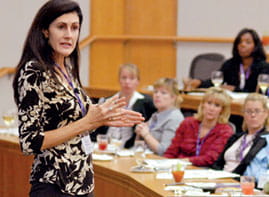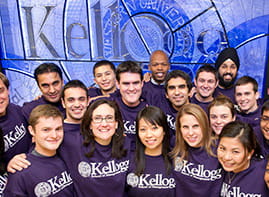4/21/2014 -
Case studies are invaluable, but sometimes real-world knowledge and insight can only be gained via in-person on-site conversation — particularly when focusing on companies that aren't mega-corporations.
With that in mind, Kellogg Associate Professor of Management and Strategy Mike Mazzeo and co-authors Paul Oyer (Stanford Graduate School of Business) and Scott Schaefer (University of Utah's David Eccles School of Business) hit the road to put in some face time with local entrepreneurs in Memphis, Missoula, New Orleans, Atlanta and more. Their learnings are detailed on their website and in their upcoming book. We sat down with Mazzeo to find out more about the project and how it relates to our Competitive Strategy Executive Education program.
Related Resources & Programs
What is the Roadside MBA project?
Roadside MBA began as an effort to learn more about the strategic challenges faced by small and medium-sized businesses. The reading lists at top business schools and the shelves of the business sections in bookstores are filled with case studies of Fortune 500 companies. But researchers and authors have paid much less attention to smaller businesses. We figured the best way to learn about them, and to get some great case studies, would be to go out on the road and meet entrepreneurs in person all across the country.
My coauthors on the project are Paul Oyer and Scott Schaefer; the three of us started our careers together in the late 1990s as junior faculty here at Kellogg. Over the last three years, we met with over 100 businesses in 24 states and have put together our findings in a book called
Roadside MBA: Backroad Wisdom for Executives, Entrepreneurs and Small Business Owners. The book is being published by Grand Central Publishing and will come out on June 10th — during our upcoming
Competitive Strategy program!
One of the themes of the book is captured in what you call "Mazzeo's Law." Can you say what that is and why it is important?
Lots of business books claim that they have the secret recipe when it comes to strategy — if you just follow what they say, or do what great companies have done, you will be successful. Our experience was just the opposite. The challenges faced by small businesses are very difficult and the right way forward could be different in different situations, depending on the nature of the company and its competitive environment. So, we coined "Mazzeo's Law," which states that the correct answer to any strategic question is "It Depends."
The trick, of course, it to know what it depends on — and that is what our book is really about. On two consecutive days in a road trip through the Northwest, we visited with startup retail banks (one in Montana, the other in Idaho). Both companies recognized that differentiating from existing competitors was crucial, but the opportunities were different in each market. So, the Montana bank specialized in high-net–worth individuals and the Idaho bank focused on community connections. That both were successful underlines the fact that there can't be a one-size-fits-all approach to strategy.
In many ways, small and medium-sized businesses are at a disadvantage when it comes to competitive strategy. How can these firms use their size to their advantage?
We call it "battling the big boys," and the small companies that we met were most successful when they were able to identify — and build their strategies around — activities that the "big boys" couldn't do particularly well. Information is often crucial, in that it is difficult for large companies to learn about the nuances of local markets. We met with a sporting goods retailer in Columbus, Ind. who used his knowledge of the sporting scene in his small town to make critical decision on inventory and marketing. By doing so, he was blunting the big box chains' advantage that typically comes from scale.
So the book focuses on the experience of these smaller companies — are there insights for larger companies, too?
We think that there are, yes. When it comes to strategy, the frameworks that help a company to understand what the right choice depends on are derived from economic reasoning. In that way, the insights are universal. But beyond that, the smaller companies in our travels often were doing things that large companies could learn from as well.
One example was a technology company that we met with in Pueblo, Colo. Because of its small size, it could not afford to invest in multiple R&D projects at the same time. The company established incentives for its salespeople to talk directly to its engineers, so that the company would be more likely to develop products that customers were really looking for. In big companies, marketing and engineering are often in their own separate silos, which makes the kind of communication necessary for effective R&D difficult.
Does this relate to what you teach in the Competitive Strategy program?
Absolutely. At Kellogg, we believe that applying frameworks from economics is the key to formulating successful strategies. The case studies from Roadside MBA provide some additional useful (and fun!) illustrations of these frameworks. The Competitive Strategy program can help executives from companies of all sizes refocus their strategic thinking on these critical fundamentals with insights they can immediately incorporate back in the office.






